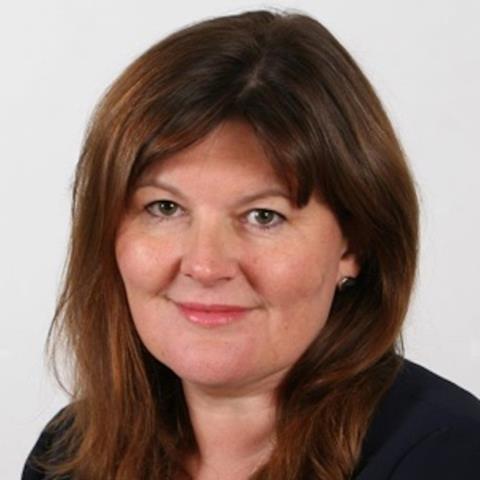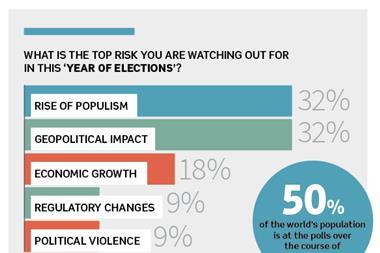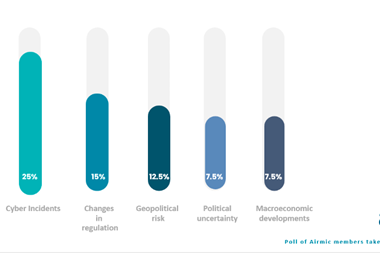Six months into her tenure as Airmic chair, Angela Iannetta reflects on how the risk profession has evolved to meet the new challenges it faces. To attract the best talent, we must loudly champion a role that has never been more important.
I was especially proud to take over as the chair of Airmic in 2023 during its 60th anniversary year.
Back in 1963, the founders of AIMIC (the original name of Airmic) were all men. Today, women have held all the top posts in the association and now make up close to 40% of our membership and 50% of our board – it’s getting better, and it’s a reflection of our times.

The year 1963 saw multiple natural and man-made disasters, including a landslide in Italy, an earthquake in Macedonia, multiple air crashes, Hurricane Flora, (one of the deadliest Atlantic storms in history), and the Mitsui mining disaster in Japan. There were also smallpox outbreaks in Sweden and Poland, which led to quarantine, lockdowns and vaccination of local populations.
WE’VE COME A LONG, LONG WAY TOGETHER
Today, we face natural disasters, man-made accidents, armed confl ict, political unrest and a year when over half the world go to the ballot box.
Add to that reduced levels of trust in those who govern the world, disease, and economic turbulence, including continued uncertainty over the projections for interest rates.
The list goes on, with dizzying technological developments, human exploration and pushing the boundaries of opportunities.
Some of the challenges facing the risk managers 60 years ago are similar to those faced by the risk professionals of today, but the rate of change has certainly picked up.
Notice I said risk professional, not risk manager. The role has grown into an industry as the complexity of today’s interconnected world means today’s risk professionals are dealing with greater breadth and depth of challenges than ever before.
“The role has grown into an industry as the complexity of today’s interconnected world means today’s risk professionals are dealing with greater breadth and depth of challenges than ever before.”
We are operating in an environment where the pace of change is unprecedented, and where the regulatory requirements are more demanding. I haven’t even touched on climate change, circularity or AI!
And while the traditional insurance market may struggle at times to provide meaningful coverage for some events, we now have access to amazing tech, data analytics, and risk modelling capabilities.
I feel optimistic about the future of the insurance industry and the essential part it currently plays and will continue to play supporting the risk management and risk financing needs of our members and wider society.
That includes innovative risk financing solutions far beyond traditional insurance, using captives, insurancelinked securities, structured products and parametrics among other solutions, as well as tools harnessing the power of technology and the potential of AI.
BECOMING A CAREER OF CHOICE
All of this makes the job of the risk professional so interesting and stimulating. Careers in risk and insurance can be very rewarding, with a wide variety of professional disciplines, knowledge and skills now needed to help corporations, intermediaries, insurance companies and other service providers meet these new challenges.
While insurance and risk management might have been seen as a ‘poor cousin’ to other sectors of the financial services industry in the past, that view is changing.
The risk industry offers an inclusive environment that allows people from all walks of life to thrive and develop, and to contribute meaningfully to the strategies of our organisations.
The role has never been more important than it is today. But we need to be better at shouting that message and encouraging new talent to make risk and insurance their career path of choice – not accidental.
“While insurance and risk management might have been seen as a ‘poor cousin’ to other sectors of the financial services industry in the past, that view is changing.”
Certainly, the professionalism of the insurance industry has grown beyond recognition since I first got involved in insurance, back in the mid-1990s in Bermuda.
In my time as Airmic chair so far, I’ve been lucky enough to meet people taking part in some of the many educational programmes the organisation offers, including the Business Excellence Programme, supported by our partners at AXA.
The quality of events, other learning opportunities, technical papers and communications developed with our partners increases year on year, as does the participation and engagement level of our members.
FUTURE PLANS FOR AIRMIC
Here is what I envisage for Airmic in the next three years:
- Airmic will need ambition and agility to achieve sustainable growth, in new member and partner segments, and across related professions in our member organisations.
- We will invest in more regional events, increasing our ability to connect locally with our members and partners.
- We will continue to develop world-class thinking, draft technical papers and survey to seek opinions.
- Airmic will use all of this to grow our learning proposition in both risk and insurance.
Above all else, our guiding North Star will be to champion the societal and strategic value of risk management and insurance in a changing world.













No comments yet